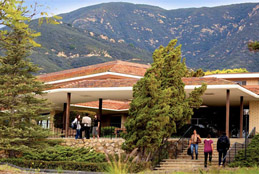Our intention at OPUS is to foster a space that invites exploration, curiosity and reflection as we work on archival preservation, deep research, and community building. Our volunteers give a gift of vital importance — their time and passion — and we continue to be mindful of ways to make this precious time more meaningful and creative.
Frequently Asked Questions
What is a living archive?
OPUS Archives is a dynamic consortium for the voices and works of many of the founding elders of depth psychology and mythology such as James Hillman, Joseph Campbell, Christine Downing, Marija Gimbutas and others. This meeting-place is enlivened each time a work or concept is visited through research and preservation and by the ever-growing catalog of materials. As a living and accessible archive, the words, voices, and artifacts tended by OPUS ensure a vital, ongoing legacy by mentoring new ideas and offering the continuing relevance of the collections’ rich content.
How do I become a Volunteer?
If you are interested in becoming a volunteer, please contact OPUS Administration:
805.969.5750 | Email
Is OPUS accepting new Volunteers at any time?
Our need for volunteers is based on production or project needs. Vacancies are filled on a first-come, first-served basis with consideration given to qualifications.
Can I come in and volunteer whenever I have the time?
We have found that spontaneous gifts of time inhibit both the volunteer from getting the most from the material, and the particular projects from receiving the attention they require. Most, if not all, of the archival projects require focused and sustained attention to detail. Three- or four-hour sessions on a regular basis work best towards achieving this balance between the interests of both the volunteer and projects at hand.
What would I be working on?
Volunteers will be working with valuable primary materials created by our eminent scholars. The work needed can vary in skill level, from basic inventory and record creation or re-housing manuscripts and artifacts, to higher levels of information and organization tasks, depending on experience.
Will I be trained?
We give you the training and guidance needed so you are comfortable and confident with whatever project you will work on.
What is the difference between archival and library research, and why is this important for a volunteer?
Archival and library research differs in a couple of ways. In the early stages of research, as an idea is just beginning to materialize, a trip to the library to scan specific titles and those surrounding them builds connections to the various layers of the topic.
In an archives, primary resource becomes an artery, constantly pumping energy into the topic. One then becomes acquainted with secondary sources, adding depth to the research concept and its resource catalog. It is at this time, when the topic is well-developed and deepened from the original and often broad-stroke question, that archival research can be valuable and necessary.
For instance, if one was using James Hillman’s Re-Visioning Psychology as a resource, one would visit OPUS to gain a deeper and foundational understanding of the text in itself. Through access to primary materials such as research notes, manuscripts, or correspondence, one would be welcomed into the content out of which Re-Visioning Psychology emerged.
Archival research, in other words, provides ways of understanding what exists behind the original work, with the ways and means of development often giving the researcher glimpses into the personal reflections and experiences had by their scholarly ancestors and mentors.
Being familiar with this difference is important because it gives an overarching context to the need for preservation of the archival material and, therefore, the sensitive call for an orientation towards and attention to detail. By volunteering your time to help tend to the collections, you ensure ongoing and sustainable access to, and the furthering of, the holdings’ collective imagination and intellectual history.
For more information please contact OPUS Administration 805.969.5750 | Email.







